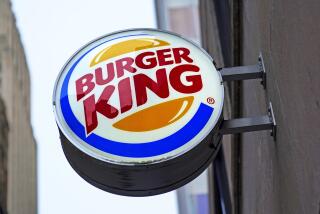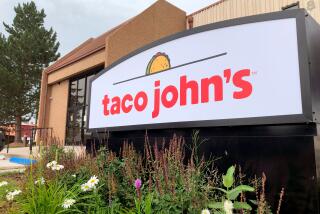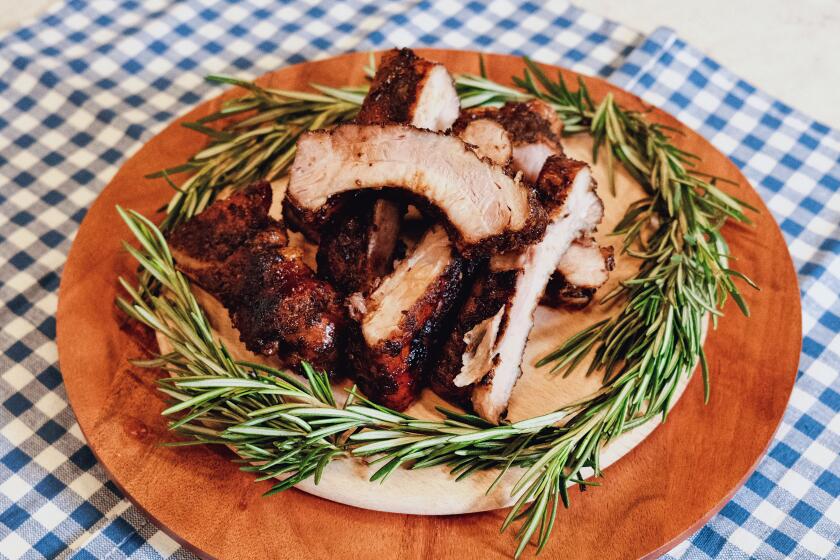Justices Won’t Referee War on ‘Better Pizza’
- Share via
WASHINGTON — The advertising war over who makes the better pizza can continue uninterrupted now, as the Supreme Court on Monday turned away Pizza Hut’s challenge to rival Papa John’s claim of having “better ingredients. Better pizza.”
The high court ended a three-year legal battle between the pizza chains, but it did not answer the question that started it all.
Pizza Hut Inc., the nation’s largest pizza chain, sued Papa John’s International Inc. in 1998 for what it said was false advertising.
The case highlighted the bitter pizza wars between the No. 1 and No. 3 chains, both of which are based in Louisville, Ky. It also highlighted the trend of business competitors increasingly asking courts to referee advertising disputes. A once-obscure provision of the Lanham Act makes illegal “false or misleading” ads. Those hurt by the claims can sue for damages.
Lawyers for Pizza Hut contended that Papa John’s use of filtered water, rather than tap water, and fresh rather than frozen dough had nothing to do with the taste of a pizza.
A jury in Dallas agreed, finding several of Papa John’s claims to be false and misleading. A judge awarded Pizza Hut $467,000 in damages.
But in September, the U.S. 5th Circuit Court of Appeals in New Orleans reversed the verdict. Its three-judge panel said the claims of “better” pizza and “better” ingredients were the “typical puffery” used in many ads. Moreover, the judges said Pizza Hut could not show that consumers were fooled by Papa John’s exaggerated claims.
Lawyers for Pizza Hut asked the Supreme Court to take up the case to clarify what must be proven to win a false advertising case. But without comment, the justices dismissed the appeal in Pizza Hut vs. Papa John’s, 00-995.
“We are happy to say again: ‘Better Ingredients. Better Pizza,’ ” said Karen Sherman, a spokeswoman for Papa John’s. “We’re just sorry it took several years to resolve this.”
Pizza Hut fired back, saying the lawsuit demonstrated that Papa John’s ads were “deceptive.”
“We have said all along that this case is about the consumer’s right to expect truthfulness in advertising,” said Mike Rawlings, Pizza Hut’s president. “We are disappointed the court did not seize this opportunity to clarify this matter for the benefit of consumers and responsible advertisers alike.”
In other action Monday, the court stressed again, this time in a case of “shaken baby” syndrome, that the 5th Amendment right against self-incrimination can be used by the innocent as well as the guilty. The unsigned opinion in Ohio vs. Reiner, 00-1028, apparently will reinstate a father’s manslaughter conviction.
When the 2-month-old boy died of broken ribs and breathing difficulty, the father--who had been caring for him--blamed a baby-sitter, who had been there several hours earlier. At her lawyer’s suggestion, the baby-sitter initially refused to testify, but she later did so under a grant of immunity.
The Ohio courts overturned the father’s conviction last year on the grounds that the baby-sitter was wrongly given immunity in exchange for testifying, even though she was not a suspect. The state judges ruled that witnesses who have no fear of prosecution cannot claim a right to refuse to testify.
But the high court said, “We have never held that privilege [against self-incrimination] is unavailable to those who claim innocence.”
More to Read
Eat your way across L.A.
Get our weekly Tasting Notes newsletter for reviews, news and more.
You may occasionally receive promotional content from the Los Angeles Times.











